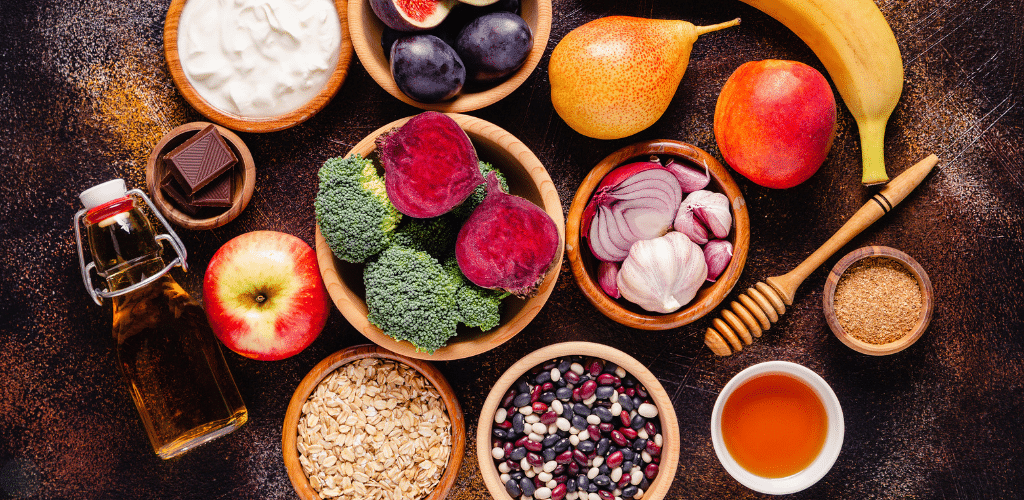Boost Your Health with Gut Healthy Foods
Your gut health is key to feeling good overall. Eating gut-friendly foods can make digestion better, boost your immune system, and improve your health. This article will show you how to eat foods that help your gut microbiome.

Key Takeaways
- Gut health is essential for overall well-being, impacting digestion, immunity, and more.
- Gut-friendly foods like probiotics, fiber-rich foods, and fermented foods nourish the gut microbiome.
- Incorporating a variety of whole, nutrient-dense foods can support a healthy gut and reduce inflammation.
- Plant-based diets and gut-healthy recipes can promote a thriving gut microbiome.
- Probiotic and prebiotic supplements may be beneficial, but whole foods should be the foundation.
The Importance of a Healthy Gut
Your gut is filled with trillions of microorganisms that make up your gut microbiome. This complex ecosystem is key to your health. It helps with digestion, nutrient absorption, immune function, and mental well-being. Eating gut-friendly foods is key to keeping your gut healthy.
Understanding the Gut Microbiome
The gut microbiome is full of bacteria, viruses, and other microorganisms. These tiny creatures are vital for digesting and absorbing nutrients. They also help regulate your immune system and affect your mood and brain function.
The Link Between Gut Health and Overall Well-being
Studies show a strong link between gut-microbiome-health and overall gut-health-wellness. A healthy gut microbiome lowers the risk of diseases like inflammatory conditions and some cancers. It also supports healthy digestion, boosts immunity, and helps with mental health.
“A healthy gut is the foundation for overall well-being. Nurturing your gut microbiome can have far-reaching benefits for your physical and mental health.”
Knowing how important a healthy gut is, you can make choices to support your health. Eating gut-friendly foods and making healthy lifestyle choices can help.
Probiotics: Nature’s Gut-Friendly Allies
Probiotics are key to good gut health. They help keep our gut balanced. These live microorganisms, known as “good” bacteria, support digestion and boost our immune system. Eating probiotic-rich foods can help your gut health and improve your overall health.
Probiotics are found in foods like yogurt, kefir, and sauerkraut. They also come as probiotic supplements. These tiny helpers add good bacteria to our gut. This helps our digestive system work better and absorbs nutrients well.
Studies show that probiotics can help with many health issues. They can ease IBS symptoms and lower cancer risk. Probiotics also support the immune system, reduce inflammation, and can even make us feel happier and more focused.
Eating a variety of probiotic-rich foods is a great way to support your gut health. You can enjoy tangy fermented foods or creamy, cultured treats. There are many tasty options to choose from.
| Probiotic-Rich Foods | Probiotic Strains | Health Benefits |
|---|---|---|
| Yogurt | Lactobacillus, Bifidobacterium | Improved digestion, reduced inflammation, enhanced immune function |
| Kefir | Lactobacillus, Bifidobacterium, Streptococcus | Strengthened gut barrier, reduced risk of infections, improved lactose tolerance |
| Sauerkraut | Lactobacillus | Improved gut motility, reduced inflammation, enhanced detoxification |
| Miso | Lactobacillus, Aspergillus | Boosted immune function, improved digestion, reduced risk of chronic diseases |
By using probiotics, you can improve your gut health and overall health. Adding these gut-friendly foods to your diet is easy and can make a big difference. It helps your body fight off sickness and supports a healthy gut microbiome.
Fiber-Rich Foods for Optimal Gut Health
Fiber is key for a healthy gut. It feeds the good bacteria in your gut. Eating fiber-rich foods helps with regular bowel movements, less inflammation, and a healthy gut.
Whole Grains and Their Benefits
Whole-grains-gut-health are great for gut health. They have lots of gut-health-fiber. These foods are full of vitamins, minerals, and antioxidants that help your digestion.
Eating a lot of whole grains can make your gut microbiome better. This leads to better overall health.
Fruits and Vegetables: Fiber Powerhouses
Fruits-vegetables-gut-health are full of gut-health-fiber. They have soluble and insoluble fibers. These help with bowel movements, reduce inflammation, and feed good gut bacteria.
Eating different fiber-rich-foods means you get various fibers. This supports your gut health.
| Fiber-Rich Foods | Fiber Content (per serving) |
|---|---|
| Lentils | 15.6 grams |
| Broccoli | 2.4 grams |
| Raspberries | 8 grams |
| Oats | 4 grams |
| Avocado | 10.5 grams |
Choosing fiber-rich-foods helps your gut and overall health. Adding whole grains, fruits, and vegetables to your meals boosts gut-health-fiber. This is good for your gut health.
Fermented Foods: Ancient Wisdom for Modern Gut Health
Fermented foods are key for keeping our gut healthy. Foods like yogurt, kefir, sauerkraut, and kimchi have been valued for a long time. They help keep our gut microbiome in balance.
Fermentation does more than just preserve these foods. It also releases beneficial bacteria, enzymes, and metabolites. These are great for our gut health. As we eat these fermented foods, they fill our gut with the good microbes we need.
The Probiotic Potential of Fermented Foods
Fermented foods are full of probiotics. These live cultures help with digestion, improve nutrient uptake, and boost our immune system. Adding fermented foods to our meals is a tasty way to keep our gut healthy.
- Yogurt and kefir are full of lactobacillus and bifidobacterium strains, which are good for our gut.
- Sauerkraut and kimchi have many probiotic bacteria. These include lactic acid producers that keep our gut balanced.
- Miso, tempeh, and natto are fermented soy foods that also support gut health.
“Fermented foods are the ultimate gut health heroes, harnessing the power of ancient microbial processes to nourish our internal ecosystems.”
Prebiotics: Feeding the Good Gut Bacteria
Prebiotics are key to a healthier gut. They are non-digestible carbs that feed the good bacteria in your gut. This supports a balanced and diverse gut microbiome.
Onions, garlic, and whole grains are rich in prebiotics. These fibers can’t be broken down by humans. They reach the colon, where they feed the good bacteria.
Prebiotics boost the growth and activity of probiotics. This leads to better digestion, stronger immunity, and a better mood and cognitive function.
Eating prebiotic-rich foods is easy and effective for gut health. You can enjoy crunchy veggies and hearty whole grains. Adding prebiotics to your diet helps your gut-friendly bacteria thrive.
The Prebiotic Advantage
- Feeds the beneficial bacteria in your gut
- Supports a diverse and balanced microbiome
- Promotes improved digestion and nutrient absorption
- Boosts immune function and overall well-being
| Prebiotic-Rich Foods | Gut Health Benefits |
|---|---|
| Onions | Rich in the prebiotic inulin, which nourishes probiotics |
| Garlic | Contains allicin, a compound that supports gut-friendly bacteria |
| Whole Grains | High in prebiotics like resistant starch and oligosaccharides |
| Bananas | Provide prebiotics in the form of resistant starch and inulin |
Using prebiotics is a simple way to improve your gut and overall health. By feeding the good bacteria, you unlock your gut’s full potential. This leads to many health benefits.
Anti-Inflammatory Foods for a Happy Gut
Keeping your gut healthy is key to feeling good overall. Eating foods that fight inflammation is a big part of this. These foods help keep your gut in balance and can prevent digestive problems.
Spices and Herbs: Nature’s Inflammation Fighters
Some spices and herbs are great at fighting inflammation. They are perfect for supporting your gut health. Here are some top choices:
- Turmeric, a bright yellow spice, has curcumin, a strong anti-inflammatory.
- Ginger, a flexible root, eases digestive issues and lowers inflammation.
- Cinnamon, a warm spice, fights inflammation and has antibacterial effects.
- Garlic, a tasty bulb, is anti-inflammatory, antibacterial, and prebiotic.
- Rosemary, a fragrant herb, is full of anti-inflammatory compounds.
Adding these spices and herbs to your food and drinks is tasty and good for your gut. It helps with gut-health-inflammation and cuts down on anti-inflammatory-foods.
“Spices and herbs are nature’s way of providing us with potent, plant-based anti-inflammatory compounds that can have a profound impact on gut health and overall well-being.”
Nutrient-Dense Foods for Gut Healing
Keeping your gut healthy is key to feeling good overall. Some foods are packed with vitamins, minerals, and antioxidants. These help keep the gut microbiome in balance.
Leafy greens like kale, spinach, and arugula are great for gut health. They’re full of fiber, which feeds good gut bacteria. These greens also have anti-inflammatory compounds that help heal the gut.
Berries, including blueberries, raspberries, and blackberries, are also good for gut health. They’re full of antioxidants and polyphenols. These can reduce inflammation and help good gut bacteria grow.
Fatty fish like salmon, mackerel, and sardines are also good for gut health. They’re rich in omega-3 fatty acids. These have anti-inflammatory effects and help fix the gut lining.
| Nutrient-Dense Food | Gut-Healing Benefits |
|---|---|
| Leafy Greens | Rich in fiber, anti-inflammatory compounds, and antioxidants that nourish the gut microbiome |
| Berries | Contain antioxidants and polyphenols that reduce inflammation and promote beneficial gut bacteria |
| Fatty Fish | High in omega-3 fatty acids with anti-inflammatory properties that support gut lining integrity |
Eating a mix of these nutrient-dense-foods can help your gut heal and stay healthy. This supports your overall health and well-being.
Gut Healthy Foods: Incorporating Them into Your Diet
Starting a gut-healthy diet doesn’t have to be hard. You can add probiotic-rich and fiber-rich foods to your meals slowly. This helps support your gut microbiome and improves your digestive system. Begin with small steps, and let your taste buds lead you to better gut health.
Yogurt and kefir are great for probiotics. These foods have live bacteria and yeasts that help balance your gut flora. Add these gut-healthy foods to your daily meals, like a smoothie for breakfast or a snack in the afternoon.
Whole grains like brown rice, quinoa, and oats are full of fiber that feeds the good bacteria in your gut. Try replacing refined carbs with these foods to help your digestion.
Fruits and vegetables are key to a gut-healthy-foods diet. Try different colors of produce to get various fibers and antioxidants that help your gut.
Remember to drink plenty of water and manage stress, as they affect your gut health too. Making small, lasting changes to your diet and lifestyle can lead to a happier, healthier gut. This supports your overall health and well-being.
“A healthy gut is the foundation for a healthy life.”
Whole Foods: The Foundation of a Gut-Friendly Diet
Whole, minimally processed foods are key to a healthy gut. They give your gut microbiome the nutrients it needs to stay healthy. On the other hand, processed and refined foods can upset your gut balance, causing digestive problems and inflammation.
Minimizing Processed and Refined Foods
Processed and refined foods often have additives and preservatives that harm gut health. Items like white bread, crackers, and sugary snacks are low in fiber and essential nutrients. By minimizing processed and refined foods, you help your gut stay healthy.
- Choose whole-foods-gut-health options like whole grains, fresh fruits, and vegetables whenever possible.
- Opt for minimally processed foods that keep their natural fiber and nutrients.
- Avoid highly processed-foods-gut-health that are loaded with added sugars, unhealthy fats, and artificial ingredients.
By eating whole-foods-gut-health, you feed your gut microbiome and boost your health. A diet that’s good for your gut is all about eating nutrient-rich, minimally processed whole foods.
“A healthy gut is the foundation for a healthy life. Prioritize whole, minimally processed foods to support your gut microbiome and overall well-being.”
Plant-Based Diets and Gut Health
Going plant-based is great for your gut health. These diets are full of fiber and nutrients from fruits, veggies, whole grains, and legumes. They feed the good bacteria in your gut, making your microbiome diverse and balanced.
A plant-based diet is high in fiber, which is good for your gut. Fiber feeds the good bacteria, helping them grow. This boosts gut function, lowers inflammation, and strengthens your immune system.
Plant foods are also packed with compounds like polyphenols and antioxidants. These help reduce inflammation, protect the gut, and make your microbiome more diverse and strong.
By eating a variety of plant-based foods, you make sure your gut gets all the nutrients it needs. This leads to better digestion, improved nutrient absorption, and a stronger immune system.
| Plant-Based Foods | Gut Health Benefits |
|---|---|
| Whole Grains | Rich in fiber, supporting the growth of beneficial gut bacteria |
| Fruits and Vegetables | Provide a diverse array of prebiotic fibers and antioxidants to nourish the gut microbiome |
| Legumes | High in fiber and resistant starch, which act as prebiotics for gut bacteria |
| Fermented Foods | Contain live, beneficial probiotics that can directly populate the gut |
Choosing a plant-based diet helps support your gut microbiome’s health and diversity. This is key for your overall well-being.
Gut-Friendly Recipes to Try at Home
Adding gut-healthy foods to your meals can be fun and rewarding. You can try probiotic-rich yogurt parfaits or fiber-packed veggie dishes. There are many gut-friendly recipes to explore in your own kitchen.
Delicious and Nutritious Meal Ideas
Feeding your gut doesn’t have to be dull or limiting. Here are some gut-healthy meals that taste great and are full of gut-friendly ingredients:
- Quinoa and Roasted Vegetable Salad: A mix of quinoa, roasted bell peppers, zucchini, and lemon-herb dressing, all high in fiber.
- Probiotic-Packed Yogurt Parfait: Layers of Greek yogurt, fresh berries, and granola make for a tasty breakfast or snack.
- Miso Soup with Shiitake Mushrooms: This savory soup has fermented miso paste and nutrient-rich mushrooms.
- Lentil and Sweet Potato Curry: A comforting dish with fiber-rich lentils and gut-soothing spices.
Try new gut-health-recipes and ingredients to make nourishing your gut fun and tasty. Adding these meals to your routine supports a healthy gut microbiome.
“Feeding your gut with the right foods is like nourishing the foundation of your overall health.”
Probiotic and Prebiotic Supplements: When to Consider Them
Keeping your gut healthy is key for feeling good overall. While eating foods that are good for your gut is best, sometimes supplements can help. Probiotic or prebiotic supplements can add good bacteria or fiber to your diet. This supports your gut health.
When might you think about using probiotic-supplements? If you’ve been sick, taken antibiotics, or have digestive problems, your gut might not have the right balance. In these cases, probiotic supplements can help bring back the good bacteria. This supports your gut health.
Prebiotic-supplements give food to the good bacteria in your gut. They are a special kind of fiber that your body can’t digest but the good bacteria can. If you’re not getting enough fiber from food, prebiotic supplements can be very helpful.
Not everyone needs probiotic or prebiotic supplements. It depends on your health and diet. Talking to a healthcare professional can help decide if these supplements are right for you.
“Gut health is the foundation of overall well-being, and sometimes supplements can play a valuable role in supporting a thriving gut microbiome.”
Learning about the benefits of probiotic and prebiotic supplements can help you make smart choices. This can lead to a healthier gut and better overall health and wellness.
Digestion-Boosting Tips for a Happier Gut
Keeping your gut healthy is more than just eating gut-health-friendly foods. Other lifestyle changes can also help your gut-health-digestion and improve your health.
Drink plenty of water. It helps with digestion-boosting-tips and keeps your digestive system working right. Try to drink at least 8 glasses of water each day. Drink more if you’re active or it’s hot outside.
Reduce stress. Stress can mess with your gut’s balance. Try activities like meditation, yoga, or deep breathing to relax.
- Exercise often. Being active helps your gut move food better and keeps it healthy.
- Listen to your body. If you have ongoing digestive problems, see a doctor to help your gut-health-tips.
Follow these digestion-boosting-tips for a happier, healthier gut. This can lead to better gut-health-digestion and overall well-being.
Conclusion
Gut-healthy foods are key to a healthy gut and overall well-being. Eating foods rich in probiotics, fiber, and anti-inflammatory compounds helps your gut. These foods, like fermented foods and fiber-rich fruits and vegetables, support a balanced gut.
Starting a gut-health-journey is an ongoing commitment. But, the benefits are huge. A healthy gut microbiome boosts your immune system, improves nutrient absorption, and can even help your mental health. Eating gut-healthy-foods is a smart move for your long-term health.
The gut-health-conclusion is simple: eat a varied diet full of foods that are good for your gut. This approach leads to a happier, healthier you. Let nature’s foods help you on your journey to better health.
FAQ
What are the key benefits of maintaining a healthy gut?
A healthy gut microbiome is key for your overall health. It helps with digestion, immune function, and even your mental health. A balanced gut improves nutrient absorption, reduces inflammation, and boosts your immune system.
What are the best probiotic-rich foods to incorporate into my diet?
Top probiotic foods include yogurt, kefir, sauerkraut, kimchi, miso, and tempeh. These foods have live, beneficial bacteria. They help restore balance in your gut.
How can fiber-rich foods support gut health?
Fiber-rich foods like whole grains, fruits, and vegetables feed the good bacteria in your gut. A diet high in fiber helps with regularity, reduces inflammation, and supports a healthy gut.
What are the benefits of incorporating fermented foods into my diet?
Fermented foods are full of probiotics, which help replenish good bacteria in your gut. They also produce compounds that support a healthy gut. Adding fermented foods to your diet is a great way to boost gut health.
How do prebiotics differ from probiotics, and why are they both important for gut health?
Prebiotics are fiber that feed the good bacteria in your gut. Probiotics are the live, beneficial microorganisms themselves. Together, they support a healthy and balanced gut microbiome.
What are some anti-inflammatory foods that can support gut health?
Foods like fruits, vegetables, and spices like ginger, turmeric, and garlic can reduce gut inflammation. Adding these anti-inflammatory foods to your diet helps create a healthier gut environment.
How can nutrient-dense foods contribute to gut healing?
Nutrient-dense foods, such as leafy greens, berries, and fatty fish, are rich in vitamins and antioxidants. These nutrients help heal and support a healthy gut. They provide the nourishment your gut needs to thrive.
What are some tips for incorporating gut healthy foods into my daily routine?
Start by adding probiotic-rich foods like yogurt or kefir, and fiber-rich foods like whole grains, fruits, and vegetables. Try fermented foods and stay hydrated and manage stress to support your gut health.
Why are whole, minimally processed foods essential for a gut-friendly diet?
Whole, unprocessed foods nourish your gut microbiome. Processed foods can disrupt your gut balance, leading to digestive issues and inflammation. Eating whole, nutrient-dense foods is key for gut health.
How can a plant-based diet benefit gut health?
Plant-based diets are rich in fruits, vegetables, whole grains, and legumes. These foods are great for gut health. They feed the good bacteria in your gut, promoting a diverse and balanced microbiome.
When might probiotic or prebiotic supplements be helpful for gut health?
Probiotic or prebiotic supplements might be helpful if you have digestive issues or an imbalance in your gut. A healthcare professional can advise if supplements are right for you.
What other lifestyle factors can contribute to a healthier gut?
Along with eating gut-friendly foods, staying hydrated, managing stress, and exercising can improve digestion and gut health. Listening to your body and addressing any digestive issues also helps optimize gut health.


